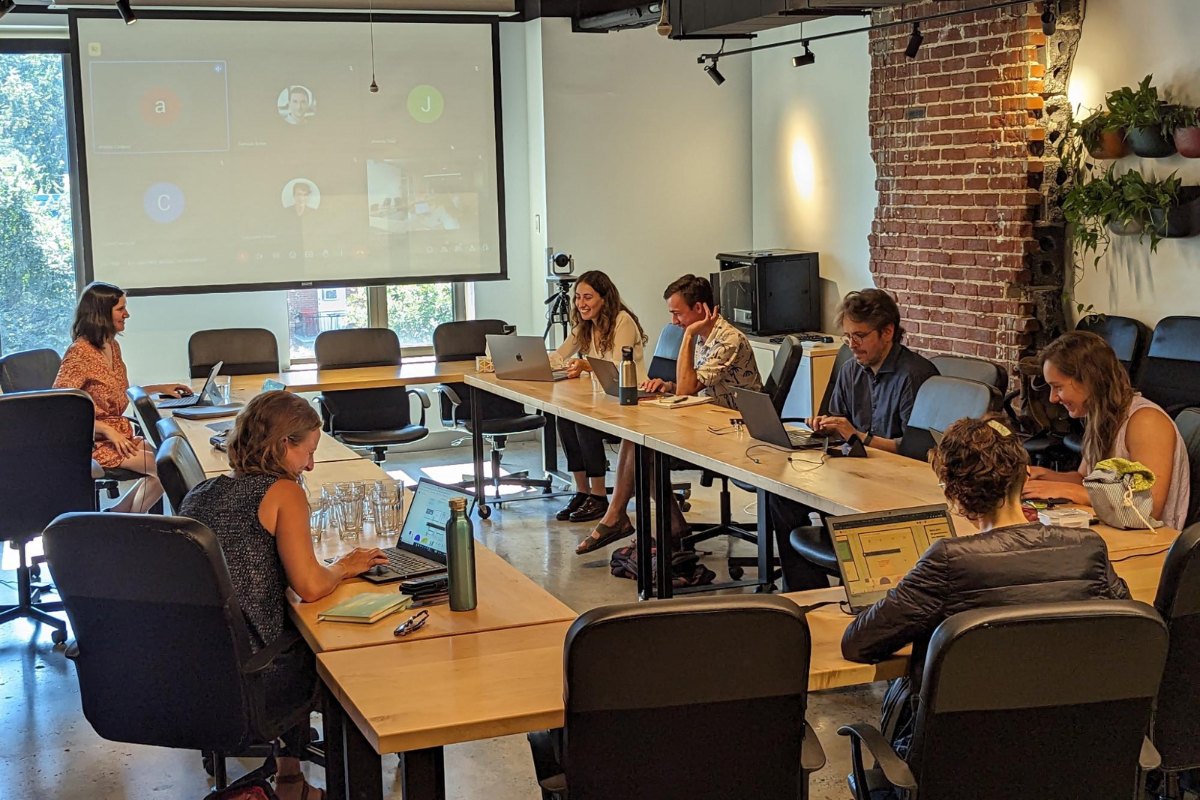The City of Montreal is establishing data partnerships with community organizations - are they ready?
Why It Matters
Data sharing and interoperability can provide a more robust view of a community and specific wellness / prosperity indicators. However, it also risks breaching the privacy and trust of community members who have not consented to having their data used this way. Data governance frameworks ensure that all organizations collecting and sharing data between them are doing so with the common good in mind.

Note: The interview with the City of Montreal took place in French, and quotes are translated into English.
Correction: An earlier version of this piece pointed to a project that was initially part of the Montreal en Commun program, but has since not materialised. Future of Good has removed the reference.
Despite millions of dollars ready to be used, most non-profits in Montreal aren’t prepared to partner with the city and other groups to easily share data, says a digital strategy organization.
For a lot of non-profit and community organizations, building robust data governance processes isn’t a priority yet, says Lauriane Gorce, program manager at Open North, a Montreal-based non-profit dedicated to digital strategy and data governance.
“It’s not enough just to share tools,” she says, noting that non-profit organizations often need hand-holding when it comes to understanding what data they already have and their processes for managing, analyzing and sharing it.
In 2019, the City of Montreal won the highest prize in Infrastructure Canada’s Smart Cities Challenge: $50 million to deliver on its promise of using data to address issues around mobility and access to food in neighbourhoods, challenges identified by the Montreal community.
For the City to reach that goal, it developed the Montreal en Commun / Montreal in Common (MeC) program, partnering with neighbourhood associations, community organizations and local non-profits. The City needed to be able to share data with these organizations while ensuring that it respected the data rights of its citizens. It enlisted OpenNorth to specifically develop a data governance framework and help non-profits fill these critical information and process gaps in the Montreal en Commun program.
Data governance is already complicated within an organization, but when several organizations are trying to partner and work interoperably using data, it’s a whole new challenge, Gorce says.
“It’s easy to imagine what bad data governance is, but how to set an example for what a ‘better’ data governance would be is a big part of the program,” she says.
For the City of Montreal, having tools that are accessible and free of charge means non-profits participating in Montreal en Commun can have more “transparent and well-regulated” conversations about their respective data strategies.
The City of Montreal says Open North’s work has been instrumental for Cantine Pour Tous, a Quebecois charity that tackles food insecurity in the province.
Using Open North’s data governance framework, Cantine Pour Tous has been able to use and gain insights from data collected by MutuAli, a digital platform for food organizations to share equipment and resources, says a City spokesperson.

What does good data governance look like?
Since being awarded the Smart Cities Grant, the City of Montreal started with 13 community projects, most underpinned by data and digital platforms. The number of projects under the Montreal en Commun continues to expand. For example, various organizations are collaborating on a mobility data hub, which will collect information about transport and travel habits in Montreal and help plan mobility services in the city.
The basis of Open North’s data governance framework is the City of Montreal’s Digital Data Charter, a document of 13 principles and three commitments: protecting human rights in the digital era, promoting the common good, and building a brighter future through data. Released in October 2020, the Charter aims to balance data protection and rights to privacy with innovation and “framed experiment.”
It states the City commits to “lowering the risk of a smart city becoming a surveillance territory” and that “every effort will be made to ensure that technical devices, such as sensors, serve to enrich the democratic universe rather than further commercial or strictly public safety purposes.”
The Charter also states that “when testing hypotheses in experimental projects, it may not always be possible to strictly follow the statements in this document. However, [the City of Montreal] will avoid drifting towards practices that may jeopardize human rights.”
In Open North’s research on data sharing, “it quickly became apparent […] that there were no turnkey data partnership or governance models that could be easily applied, duplicated or scaled. Despite the interest in notions such as data trusts and digital commons, practical, mature and documented experiences are still few and far between.”
Each instance of data sharing between two or more organizations would require a specific governance framework and parameters, which should cover who has access to the data, intended use of the data, restrictions on how organizations should use the data, and information about liabilities and warranties.
Gorce adds that organizations or even the general public aren’t always able to translate these theoretical concepts about data governance into practical and tangible activities.
Even when the City of Montreal launched a public feedback portal as it developed its Digital Data Charter, “there was no real engagement [and] they only had a few answers,” Gorce says.
This lack of engagement is similar for community organizations. While most organizations have data, they might not have the data literacy to analyze and draw insights from it.
Each organization also usually has a different internal culture around data and varying levels of organizational capacity to take action with the data they collect.
“We need to meet organizations where they’re at and explain why [data governance] is important,” Gorce says.
To do this, the Open North team has taken the 13 principles from the City of Montreal’s Digital Data Charter, broken them down into themes, and assigned 74 actions that are both concrete and approachable, Gorce says.
Many of the non-profits engaged in the Montreal en Commun program are aware that data is helpful for their decision-making and agree that Open North’s work can support their organizational data literacy. However, that knowledge needs to translate to behaviour and process changes, Gorce says.
Currently, half of the organizations involved in the program are committing less than an hour a month to data governance. Another quarter are committing one to two hours per month, while 10 per cent aren’t committing any time to it at all.
The framework is in place: where does Montreal en Commun go from here?
Data used for the common good and being a part of a project that others can learn from are two of the principles that underpin both Montreal’s Digital Data Charter and OpenNorth’s data governance framework.
To do this, “as part of Montreal in Common data, applications, and results of experiments will be shared in the public domain and will be available to all organizations that want to reproduce a concept or take it further.”
Establishing a data commons will require the City and non-profit partners to ensure that data is adequately anonymized and securely stored, such that personal, sensitive or identifiable information is not compromised while establishing a data commons.
Christian Medina, manager of global programs at Open North, says the team often encourages the city government and non-profits to consider whether gathering more data is always necessary.
“We purposefully challenge some of the discourse that comes out of the private sector and from ‘tech bros,’” Medina says.
“Our response is: ‘Do you really need the fanciest [piece of technology], or do we need to have a conversation around power dynamics before implementing or buying the shiny new thing?’”
Open North has developed several resources for non-profits who are part of the Montreal en Commun program, including an online learning module for organizations to understand what data governance is and a self-assessment tool for participating organizations to assess where they are regarding their own data governance and literacy.
However, Gorce recognizes there is still a long way to go. The feedback that Open North has received so far is that while the resources are helpful, they’re also complicated.
This can make learning about data governance harder for staff in the non-profit sector, who already have few resources and little time.
“We’re very aware that we can do better,” says Gorce, adding that in the next phase of the project, Open North will look to develop a user experience that factors this in.

